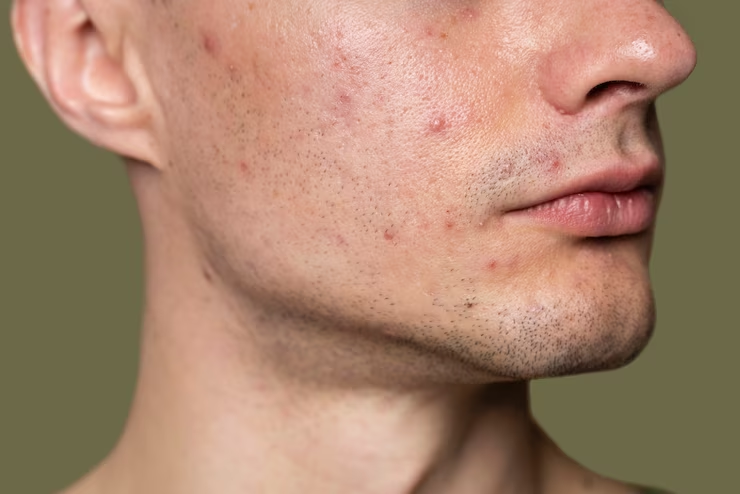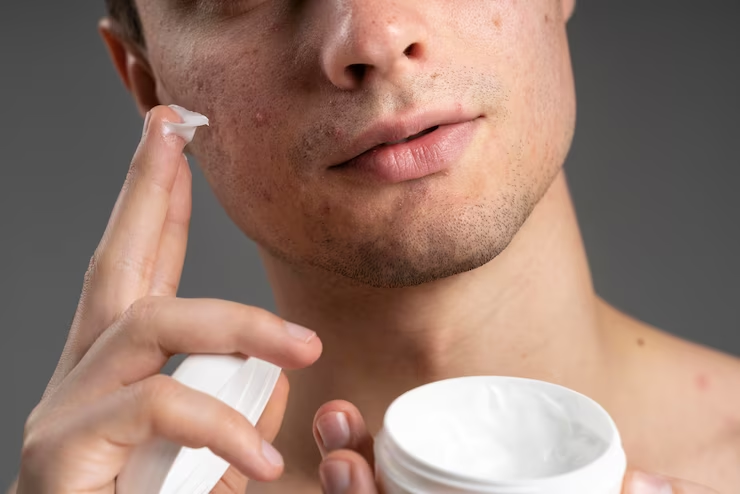
Whiteheads are acne that can occur anywhere on the face, including around the mouth. While they may not be as prominent as other types of acne, whiteheads around the mouth can still be unsightly and frustrating. They can also be irritable and cause discomfort. In addition, they can be challenging to treat, as the skin around the mouth is delicate and sensitive.
Don't worry! We're here to tell you that it's normal and not a cause for concern. In this blog post, we'll explore the causes of whiteheads around the mouth, ways to prevent them, and effective treatments to eliminate them. You can achieve clearer, healthier-looking skin with the right knowledge and tools!
What Are Whiteheads?
Whiteheads are a type of acne. They are called closed comedones and occur when a pore gets clogged with dead skin cells and excess oil. The result is a small white, bump which is sometimes hard, that you can feel beneath your skin. The most common place for a whitehead to form is on the face, but it can also develop on other body parts like the chest, back, and shoulders.
Unlike blackheads (caused by excess oil), whiteheads don't have an opening at the top of the bump. This means that they're unable to release all their gunk—which can lead to more serious problems if left untreated!
Causes of Whiteheads Around the Mouth
Poor skincare routine
You should always wash your face twice daily with a gentle cleanser and pat dry after each wash. Also, ensure you've removed all traces of makeup before bedtime and any lip product containing oil (such as chapstick). Use of greasy cosmetics can cause whiteheads.
Overuse of lip balms or lip products
Lip balms are excellent for keeping your lips protected and moisturized all day - but if you use them too often or apply them too liberally, they can clog your pores and cause whiteheads to form around your mouth. Make sure you apply the lip balm only on your lips and not the skin around the mouth. If you're prone to getting whiteheads around the mouth, using a lip balm sparingly and only at night before bedtime is best.
Consuming certain foods
Some foods cause acne breakouts around the mouth area because they make your body produce extra oil (like dairy products, sugary and fatty foods). If you notice a pattern between eating something and having whiteheads appear on your face within 24 hours after eating it, then consider cutting that food out of your diet.
How To Prevent Whiteheads Around the Mouth

Cleaning the mouth area properly
Whiteheads are very common on the chin and jawline because facial hair usually covers these areas, which traps dirt and dead skin cells—and, therefore, bacteria—in the pores. To prevent whiteheads from forming in these areas, cleanse them at least twice daily with a gentle cleanser. Remove all makeup and cosmetics before you go to bed. Use an exfoliating scrub once or twice a week.To cleanse your mouth, use a soft toothbrush and warm water with a small amount of toothpaste if necessary (avoid using too much toothpaste because it can dry out your skin).
Avoiding certain foods
Certain foods can cause acne, including dairy products, sugary and fried foods. If you notice that you tend to have whiteheads around your mouth after eating these foods, consider cutting them out of your diet as much as possible and see if that makes a difference.Using non-comedogenic lip products
If you find yourself picking at these blemishes and squeezing them open (which can lead to scarring), try using non-comedogenic lip products such as Vaseline or Aquaphor. These products will help soothe redness and irritation while also preventing further damage from occurring around those areas where your skin is especially thin.Avoiding picking or squeezing the whiteheads
Whiteheads are pimples that haven't ruptured and have a pore filled with sebum (skin oil) and other debris. The bacteria that causes acne can live in this pore and cause an infection. When you pick or squeeze the whitehead, you introduce bacteria into the pore and worsen it!The best way to prevent whiteheads around your mouth is to keep your hands off them. If you notice one coming up, wash your hands thoroughly before touching it, and try applying a little benzoyl peroxide gel onto it as soon as possible.
How To Treat Whiteheads Around the Mouth
Over-the-counter products
Over-the-counter products that treat whiteheads around the mouth include benzoyl peroxide, salicylic acid, and retinoids (which are non-prescription strength retinoids.)
Benzoyl peroxide
is an antibacterial ingredient that unclogs pores and kills acne causing bacteria. It also has a drying effect on the skin, which helps reduce inflammation. This makes it a good option for mild-to-moderate acne.Salicylic acid
is another ingredient that can help clear up whiteheads around the mouth. It loosens dead skin cells in clogged pores and dissolves excess oil, making it easier for them to come out naturally so your skin doesn't look oily anymore.Retinoids
are a type of vitamin A that is commonly used as an acne treatment. They can help shrink your pores, reduce inflammation, and prevent breakouts. They work by exfoliating the skin's outer layer and getting rid of any dead skin cells that might be clogging up your pores. This helps to unclog them and make them appear less visible! If over the counter retinols do not work, your doctor will prescribe prescription strength retinoids to be used at night.Azelaic acid is also a prescribed topical agent which clears whiteheads.
Tips when using topical agents
Use a thin layer on the affected areas and gently rub it in, once or twice a day. You may need to use these topical medications for several weeks or months before your skin starts improving.
Do not get the medication into your mouth or lips while applying around your mouth, because they are for use only on the skin. If it does get into the mouth, rinse it off then and there.
Avoid using on areas of skin that has scrapes, cuts or sun burn. If you shave your face regularly, watch out for any scrapes or cuts before you apply the topical agents around the mouth.
Always wash your hands with soap and water before you apply the topicals. The affected areas of the skin must be clean and dry.
If you have whiteheads around your mouth check with your doctor before you use after shave lotions or other drying face products.
Home Remedies
Honey and cinnamon mask
Honey is a great exfoliant and can help to fight acne, too. Mix two tablespoons of honey with 1/2 teaspoon of cinnamon powder to make a paste. Apply the paste over your face, avoiding the eyes and lips. Leave it on for 15 minutes before rinsing off with warm water. If you don't like the smell of cinnamon, add a few drops of essential oil (like lavender) instead!Tea tree oil
Tea tree oil is an antiseptic and antibacterial agent that helps keep skin clear and healthy-looking. Mix 1/4 cup of water with 1/4 cup of tea tree oil, then pour it into a spray bottle and spritz it on your face every morning after cleansing! You can also use this mixture as an overnight spot treatment by applying it directly to blemishes before bedtime, but be careful not to get any in your eyes because it will sting!Aloe vera gel
Apply aloe vera gel directly to blemishes or dilute it into a moisturizer to avoid using it straight from the plant. Leave overnight or until morning, then rinse with warm water and follow with a hydrating moisturizer like coconut oil or shea butter for best results!Professional Treatments for Whiteheads Around the Mouth

Chemical peels
Chemical peels are a great way to treat skin and eliminate acne scars, wrinkles, and other imperfections. A chemical peel uses acids glycolic acid or TCA that remove the top layer of your skin. It causes your skin to regenerate and grow new cells, which leads to fresher, healthier-looking skin.
The procedure is usually done in a doctor's or cosmetic surgeon's office by an expert professional who can determine what kind of chemical peel is best for you based on your skin type and condition.
Microdermabrasion
Microdermabrasion is a procedure that uses tiny crystals or an acid solution and a vacuum to remove dead skin cells from the surface of your face, leaving it smoother and brighter looking than before. The procedure typically requires no anesthesia and can be done at home with products from the pharmacy or online. Microdermabrasion does not cause scarring or any skin color change. It is usually safe if it is done by an experienced qualified practitioner.
If you decide to do it yourself at home, follow all instructions carefully so you don't harm yourself or cause more damage than good!
Extraction
Extractions are commonly used to eliminate blackheads, whiteheads, pimples, and other blemishes on your face or body. They're often used if you have sensitive skin or large pores—this helps prevent scarring from occurring while removing the blemishes themselves. An extractor tool removes them from your skin professionally in a doctor's office or spa.
Conclusion
In conclusion, whiteheads can be frustrating and challenging. However, with the right knowledge and approach, preventing and treating them effectively is possible.
We've explored the causes of whiteheads around the mouth, ways to prevent them, and effective treatments to eliminate them. Remember that prevention is key, so maintaining a healthy diet, practicing good hygiene, and using non-comedogenic lip products can go a long way in preventing them.
If you develop whiteheads, over-the-counter products, home remedies, and professional treatments are available to help you eliminate them. Finally, remember to be patient and consistent in your approach. Clearer, healthier-looking skin takes time and effort, but it's definitely worth it. So, take action today and say goodbye to whiteheads for good!









